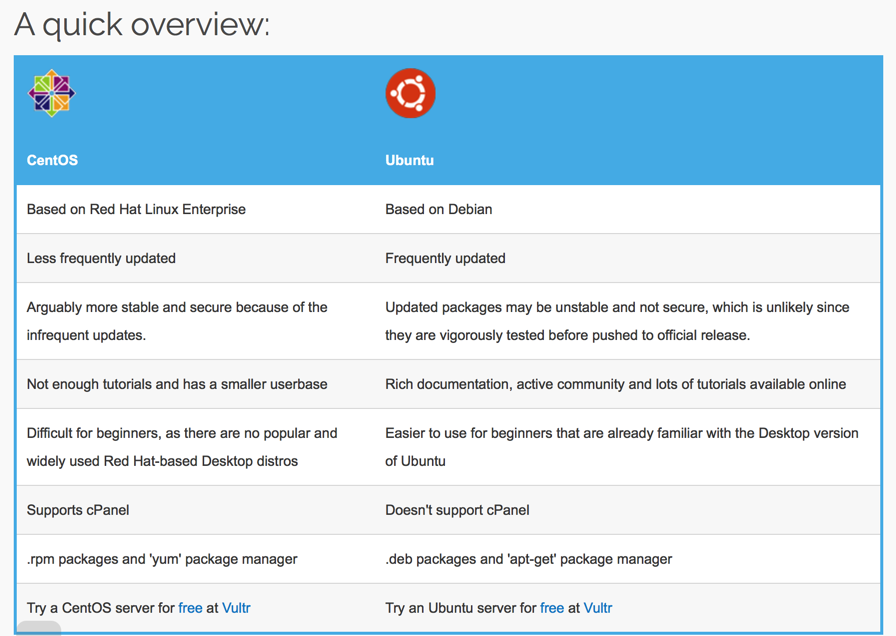Linux服务器选择 ubuntu centos
Linux server ubuntu vs centos
服务器操作系统应该选择 Debian/Ubuntu 还是 CentOS? – 知乎
如何说服运维选择 Debian/Ubuntu 而不是 CentOS? – 知乎
“哪个更适合新手?
Ubuntu。
一如往常那样,它主要取决于你的需求和以前的经验,但一般来说,Ubuntu 对于初学者来说是更好的选择。主要是因为这两个原因:
* Ubuntu 有一个庞大的社区,随时可以免费提供帮助。我指的是真正的大。数以千计的用户分布在数百个不同的在线论坛和兴趣组内。甚至有现实生活中的大会。你也可以为 CentOS 找到很多教程和帮助,特别是对于简单的 LAMP 栈和流行的应用程序而言。
* Ubuntu 服务器对于以前使用过 Ubuntu 桌面的人来说会容易得多。同样的情况也存在于 CentOS 和 Fedora 之间,但是 Ubuntu 桌面版比任何其他基于 Linux 的家用桌面更受欢迎。
所以,如果你是一个初学者,而且没有任何特殊要求,那就去使用 Ubuntu 服务器。 更好的是,你可以从一个便宜的托管服务提供商那购买服务,这样你就可以在你的服务器上进行实验,还有一个专业的 24/7 支持团队准备好帮助你。
哪个更适合商用?
CentOS。
同样,你仍然可以使用 Ubuntu 作为商用网站或公司内部服务器,但 CentOS 有它的优势:
* CentOS(可以说)更稳定以及更安全。由于 CentOS 的更新频率较低,这意味着软件测试的时间更长,并且只有真正稳定的版本才会得到发布。如果你使用 CentOS,你不会因新的有 bug 的应用程序版本而遇到任何稳定性问题,因为你不会得到那个新的有 bug 的版本。
* 大多数控制面板(包括最受欢迎的控制面板 – cPanel)仅支持 CentOS。所以这意味着如果你是一个网站托管公司,或者如果你是一个有很多客户的网站服务代理商,并且需要一个控制面板 – CentOS 是一个更好的选择。”
服务器操作系统应该选择 RHEL/CentOS 还是 Debian/Ubuntu ?
“Ubuntu/Debian 的优势
* apt-get 确实比 yum 好用。
* 软件包数量多,功能性版本更新快。
* 因为上条,研发使用 Ubuntu 比较多,环境能无缝切换。
* Ubuntu 对 Linux 初学者非常友好。
Ubuntu/Debian 的劣势
* Ubuntu 补丁更新慢,官方只管放包不管修
* Debian 生命周期不固定,新版本发布以后,上个版本再维护18个月,一般生命周期在5年。当生命周期过了以后,就没有安全补丁,你的服务器就会裸奔或需要重新安装系统。
* Ubuntu 的 LTS 版生命周期是5年。
* Debian 由于有版权上的考虑和代码纯洁性的洁癖,一些硬件驱动和软件被删除了,导致安装过程有问题。比如 Dell 服务器上,大量使用的忘开 BroadCom,就驱动不了。
* Debian 的 LTS 支持,不是由 Debian 官网安全团队维护的,而是由其他志愿者维护的,工作效率和质量是否有保障还不知道。
* Ubuntu 社区经常搞些莫名其妙的东西,而且一段时间之后可能就不用了。
RHEL/CentOS 的优势
* 受鸟哥等 RH 系列 Linux 书籍的影响,国内运维人员对 RH 的系统最熟悉。如果你是一个工程师,熟悉了 CentOS/Redhat,找工作更容易。如果你是一个企业老板,相对也容易招聘到熟悉 CentOS/Redhat的工程师。
* CentOS/RHEL 的生命周期是7年,基本可以覆盖硬件的生命周期。RedHat 5、RedHat 6的生命周期,延长到10年。
* RedHat 是一个值得尊敬的开源公司,拥有一批 Linux 内核方面如雷贯耳的大牛。长期以来对 Linux 内核的贡献程度都是最多的。可以说,如果一个 Linux 方面的问题,RedHat 搞不定,那么很少有其他公司能搞定了。
* CentOS/RHEL 对硬件支持很好,主流硬件厂商早就将服务器拿过去测试,一般不存在硬件兼容性问题。
* 大量商业软件,比如 Oracle,都是针对 Redhat 认证的,有大量的帮助文档和使用说明,有良好的技术支持。出了问题,也容易在网上找到类似的答案和经验。
* CentOS 是 Redhat 的克隆版,如果需要可随时平滑切换到 Redhat,从而享受 Redhat 的厂商服务支持。
* Redhat 对安全漏洞的响应更及时。
* RHCE 的培训,相对完善,认同程度高。
* CentOS/RHEL 的批量安装更方便。
RHEL/CentOS 的劣势
* 由于生命周期长,线上系统往往版本老,最近的软件在 RH 的官方库里找不到。只能自己编译。还得专人负责补丁更新。
* 如果研发多使用 Ubuntu,线上生成环境使用 RHEL,环境的变更会需要更多的调试,大幅影响研发效率。”
Debian vs Ubuntu vs CentOS: Linux distribution comparison | Fasthosts Blog
“Ubuntu is probably better for Linux beginners because it’s easier to set up and use, Debian is probably better for experienced users who want full control, and CentOS is probably better for businesses who want a more stable and secure Linux distro.”
CentOS、Ubuntu、Debian三个linux如何选择 – CSDN博客
Difference Between CentOS vs Ubuntu and their features.
What Is The Difference Between CentOS & Ubuntu?
CentOS vs Ubuntu: Choosing the Right Linux Distribution for Your Server – SingleHop
“Pros and Cons of Ubuntu and CentOS
In some cases, a choice to go with Ubuntu over CentOS or vice versa comes down to personal preference. However, there are real pros and cons of each.
CentOS
Pros: Highly reliable and stable for enterprise workloads, a free variant of the well-trusted Red Hat Enterprise Linux (RHEL), each major version serves or up to 10 years with free security updates for 7-10 years, less support required, lightweight.
Cons: Less frequent updates, lacks feature richness compared to other operating systems.
Ubuntu
Pros: Frequent updates, feature rich, leading edge, developer friendly, stable, support for five years for major releases.
Cons: Higher resource consumption, less secure out of the box, requires more support to stay up to date.”
CentOS vs Ubuntu: Choosing the Best OS for Your Server
“For smaller businesses as well as beginners, Ubuntu is a safe choice. Given their huge user base, Ubuntu has a wealth of online resources, tutorials, and online forums, along with a large community of open source developers. This makes finding solutions to problems much easier.
CentOs is also a good choice for small and medium-sized businesses and websites requiring cPanel. While their user base is much smaller than Ubuntu, CentOS still houses a smaller online community but with more premium support options.”
Whats is better and why? Linux CentoS or Ubuntu? | DigitalOcean
“In short:
* CentOS is great for businesses and developers that don’t need the newest releases. CentOS is more stable and secure because of that – it always uses stable (but older) versions of their software.
* Ubuntu uses the latest (non-beta) versions and if you want all the latest features of some app/software, then get Ubuntu. If you’ve used the desktop version of Ubuntu, get an Ubuntu server. It will be easier. Ubuntu has a lot more community support (tutorials, forums etc.), so it’s great for beginners.”
CentOS vs Ubuntu: Which one is better for a server – ThisHosting.Rocks
“Which one is better for beginners?
Ubuntu. As always, it highly depends on your requirements and previous experiences, but generally, Ubuntu is a better choice for beginners. Mainly because of these 2 reasons:
* Ubuntu has a big community that’s ready to help for free. And we really do mean big. Thousands of users in hundreds of different online forums and groups. Even real life conventions. You can still find a lot of tutorials and help for CentOS too, especially for simple LAMP stacks and popular applications.
* Ubuntu server would be a lot easier for someone that has previously used Ubuntu desktop. The same goes for CentOS and Fedora too, but the Ubuntu Desktop version is far more popular than any other Linux-based distro for home-use.
So, if you are a beginner and don’t have any special requirements, go with an Ubuntu server. Even better if you get a server from a cheap managed provider, so you can experiment on your server and have a professional 24/7 support team ready to help you.
Which one is better for businesses?
CentOS. And again, you can still use Ubuntu for a business website or an internal company server, but CentOS has its advantages:
* CentOS is (arguably) more stable and secure. Since CentOS has less frequent updates, that means that the software is tested for a longer period of time and only truly stable versions get released. You won’t get any stability issues from a new, buggy release of an app if you use CentOS because you won’t actually get that new, buggy release.
* Most control panels (including the most popular one – cPanel) support CentOS only. So that means if you are a web hosting company, or if you are a web agency with a lot of clients and need a control panel – CentOS is a better option.

”
如果用 linux 开发环境, centos 好一点, 还是 ubuntu 好一点呢? · Ruby China
CentOS、Ubuntu、Debian三个linux如何选择 – CSDN博客
【总结】
别人的一些建议:
稳定, 可靠, 问题能及时修复. 请选择centos
我反对使用 Ubuntu 作服务器
早期,我们使用 Debian 作为服务器软件,后来转向了CentOS
个人总结:
Ubuntu:
适合小公司
更适合新手
版本发布更快更新
可以用上最新版本
用的人(根据某调查)没Ubuntu多
CentOS
适合小到中等公司
更适合有经验的人
版本发布相对没Ubuntu新,但是(不少人觉得)更稳定
不一定最新版本,但是肯定很稳定
社区更大,用的人(好像)更多
转载请注明:在路上 » 【整理】Linux服务器选择 :ubuntu vs centos